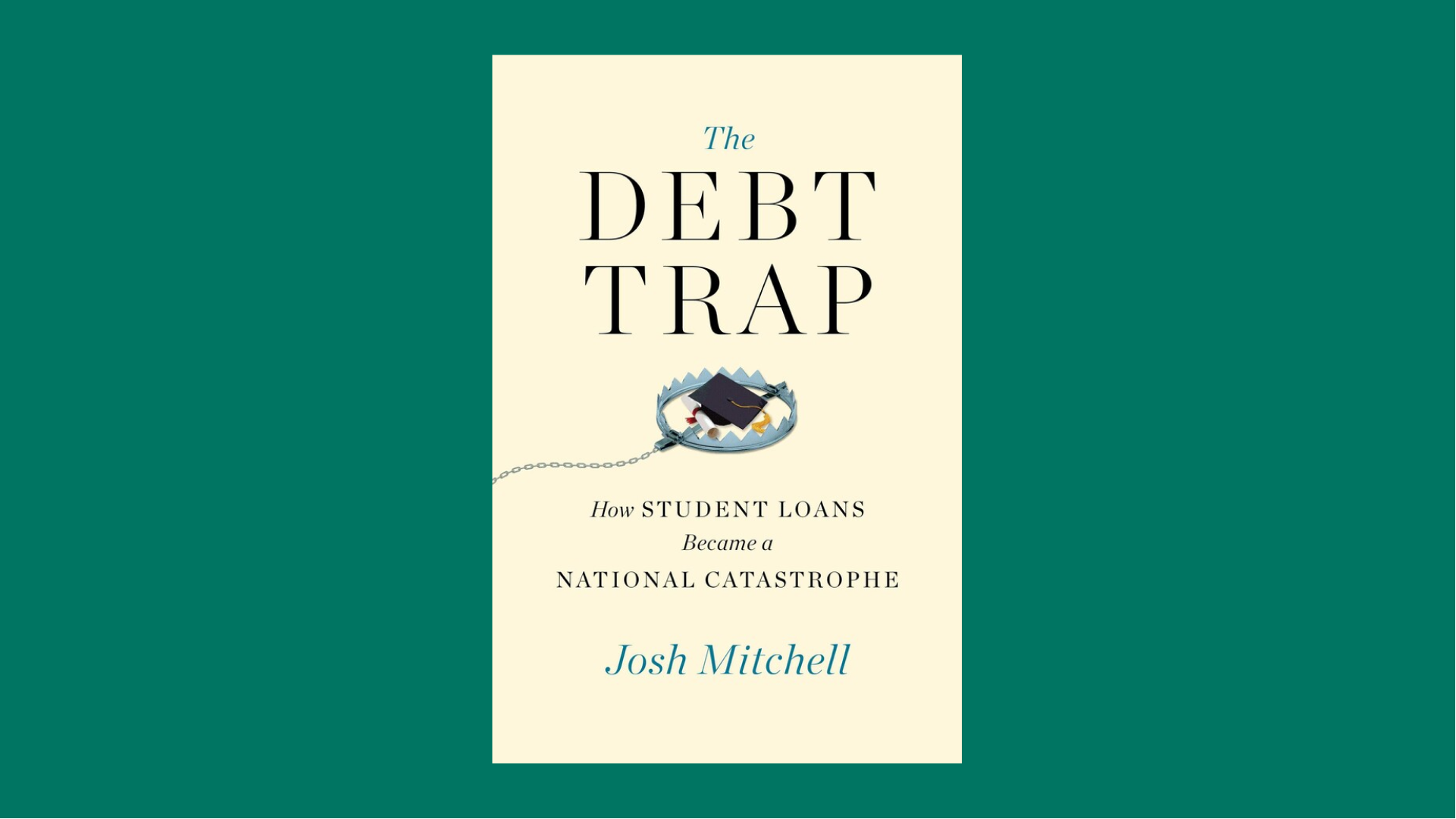Josh Mitchell wants to tell you a story about student loans, one that he’s heard time and time again. Mitchell has been covering higher education and student loans for the past 12 years for the Wall Street Journal, and he frequently gets hundreds of emails from borrowers sharing their debt stories.
“I would get notes from readers sharing these heartbreaking stories about how they had so much debt and couldn’t pay it off,” he says. “And how they got a degree that just wasn’t worth anything in the labor market.”
These stories became the backbone of his first book, “The Debt Trap: How Student Loans Became A National Catastrophe.” In it, Mitchell explores the history of student debt in America and how corruption, predatory actors, scams, and poor government policy created an industry that has compromised the financial lives of millions of Americans. More than 44 million Americans owe $1.6 trillion in student debt.
We spoke with Mitchell to discuss his book, what he’s learned during his tenure writing about student loans, and the path forward for addressing the student loan debt crisis.
Why did you decide to write this book now?
I realized there was a huge appetite from readers to read more about the topic and really understand how the system developed and how it became so dysfunctional. I just wanted to do a big project that unpacked everything — it’s such a complicated system and I wanted to retrace the steps to where we are right now. I hadn’t really seen books that had gone through the history of the program, and I felt like there was a gap in the market that I could fill.
Why was it important to include first-person accounts?
But I wanted to write this book in a way that told a story, not like an academic book. I like to tell people’s stories, and the human element is such an important part of this whole student loan system. It’s important to show the impact our policies have on people.
So much of the public student loan conversation is dominated by numbers, and I think numbers have enabled people to ignore the human consequences of policies.
For example, for years students have been told: “Going to college is worth it. Sure, you’ll take on some debt, that’s an investment that will pay itself off.” And for some, it does. But I think students became overly reliant on this idea that going to college will get you an extra million, 2 million dollars over their lifetime. It’s true that on average college does boost your earnings, but that ignores the problem areas of the system.
The only way to highlight how catastrophic student debt can be is to show how debt affects people, through these touching human stories.
What has been the most negative impact of the student loan debt crisis?
One of the eye-opening things for me, is that for a lot of students, their balance is continuing to grow because of the compounding interest and the way the government charges interest.
In addition, even though the average student loan balance is $39K, there’s a significant minority who owe more, and that minority has been growing. That’s the most troubling, that these high balances have grown higher. Before, the norm was taking about 10 years to pay them off, and now you’re seeing 20, 30 years to pay them off.
Do you think college should be considered essential for everyone?
I don’t have a strong opinion on that. I do think that at least in my generation, the emphasis on getting a four-year degree became too extreme, to the detriment of programs that can fill gaps in the labor market, like apprenticeship programs. I think politicians on both sides of the aisle have been talking in recent years about the importance of these programs and jobs that don’t require a four-year degree. I don’t think there's a one size fits all when it comes to college.
However, I do think that we ignore the fact that college is really intertwined with K-12 school, which I don’t really address a lot in my book. When we look at how many people go to community college and how many people need to take remedial classes in community college, I’ve realized that we’ve relied so much on college to be a [solution] for the broad societal problems that originate when people are younger.
What was the most surprising thing you learned when writing this book?
A lot of times, when schools set their prices, it’s arbitrary. When you follow the debate about tuition, there’s a lot of ideological opinions about what's driving tuition increases. But when you actually talk to presidents or former presidents of these schools, you’re finding that in many cases, they’re trying to get as much money as they can out of these students. They’re setting their prices to the maximum the market will bear.
Schools often say, “Well, we’re raising tuition because states aren’t giving us adequate funding.” And there’s some truth to that, but there’s no set amount that schools would accept from the state to avoid raising rates. They’re just raising tuition every chance they can, which is very much acting like a business.
Why do you think there’s so much friction when it comes to student loan debt forgiveness?
The political realignment that’s happened in recent years is very much tied to college. Increasingly, the Democratic party is made up of college graduates and the Republican party is increasingly made up of non-graduates. I think that college in some ways is a proxy for these larger societal and political divides. People on the right may say, “Well, why are we going to spend our taxpayer money forgiving loans for college graduates and that’s not fair.” There’s even a big debate within the Democratic party about that, too.
I think that another reason why there’s friction is that forgiving student debt won’t fix the underlying issues that led to the sharp rise in debt in the first place. If you pass this one-time measure, what happens after? The government is making new loans to students every single day.
What can be done, legislatively, to fix this problem?
When I talk to experts on both sides of the political spectrum, there seems to be this broad consensus that schools need to have more skin in the game and be discouraged from raising tuition too high and giving students so much debt that they can’t repay. Now, how do you do that specifically? The devil is in the details, but that’s generally where the consensus is.

